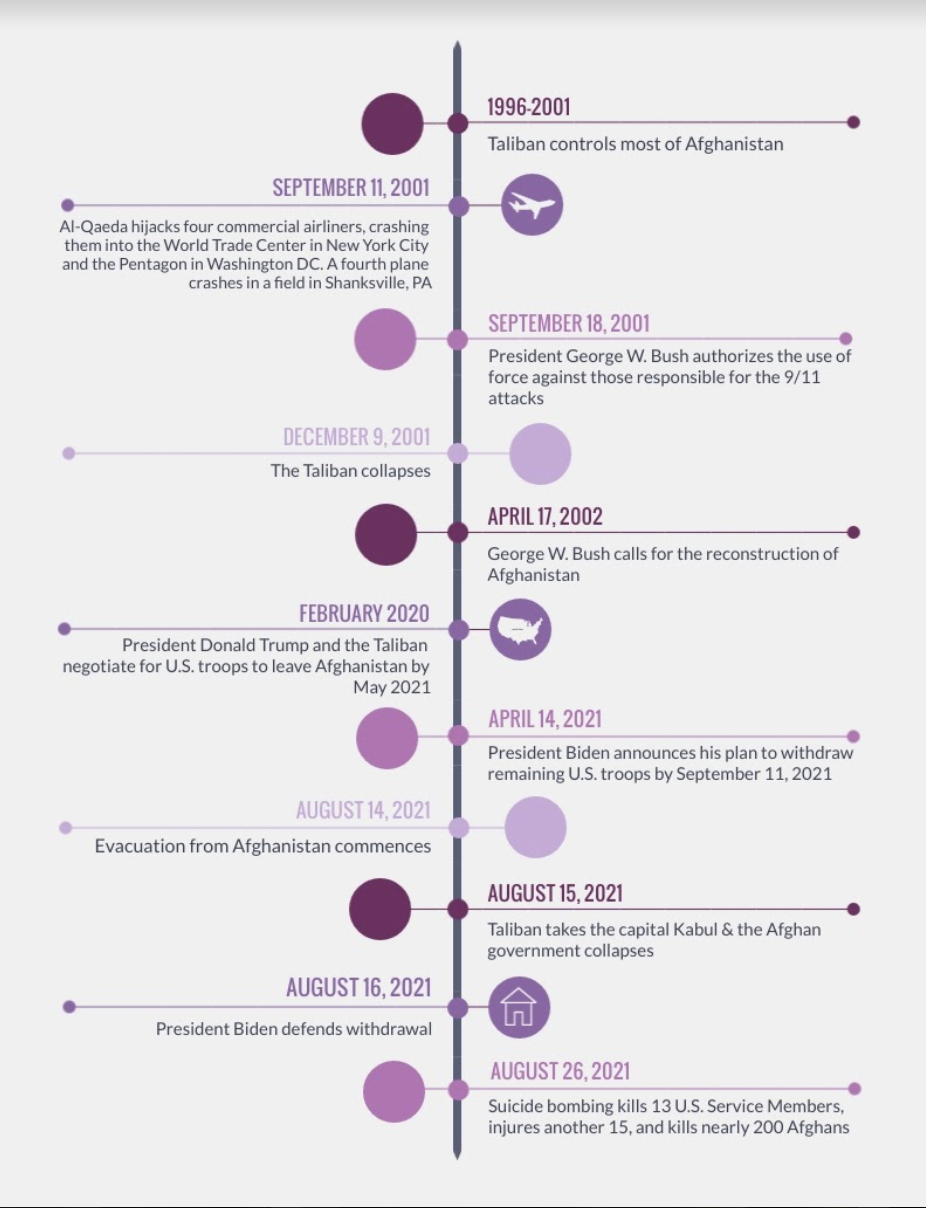As our nation approached the 20th anniversary of the September 11 attacks, U.S. troops withdrew from Afghanistan, ending the longest war in U.S. history. The evacuation did not go as planned, and many face the consequences of these actions, especially Afghan women.
The conflict in Afghanistan dates back to the aftermath of the attacks on September 11, 2001 when the Taliban, an extreme fundamentalist group, refused to turn over Osama bin Laden, founder of al-Qaeda and the main architect of the 9/11 attacks. Under the presidency of George W. Bush, American and British forces pushed out the Taliban who ruled most of Afghanistan from 1996-2001. Though this was a quick success, the efforts to remodel Afghanistan as a modern democracy has lasted decades.
In February 2020, the Trump administration and the Taliban negotiated for U.S. troops to leave by May 2021. On April 14 of this year, President Biden announced his plan to withdraw the remaining U.S. troops by September 11 to mark the 20th anniversary of 9/11. In this speech, he declared, “It’s time to end America’s longest war.” The president then set a deadline for U.S. troops to evacuate Afghanistan by August 31. The evacuation commenced on August 14 and was one of the largest airlifts in history, evacuating U.S. citizens, special VISA immigrants, and other vulnerable Afghans. Facing little resistance, on August 15, the Taliban seized the capital, Kabul, and the Afghan government collapsed. Just five days before Biden’s evacuation deadline, a suicide bomb attack at the Kabul Airport rocked their evacuation plan. The bombing killed nearly 200 Afghans, 13 U.S. service members, and injured another 15 service members, and was the deadliest day for the U.S. military in Afghanistan since 2011. All U.S. troops have now evacuated Afghanistan, but many U.S. citizens, mostly dual citizens and longtime residents, along with at-risk Afghans, remain.
As a result of the Taliban takeover, the growing fear is that the Taliban will oppress Afghan women. The Taliban impose a harsh interpretation of Sunni Islam, banning television and music. They prohibit girls from receiving an education or working, and by law, they force women to wear burqas, head-to-toe coverings. The United States has spent over $780 million to promote women’s rights in Afghanistan over the past two decades. Young Afghan women and girls who grew up during the U.S. occupation received a chance at education and careers that were not possible under Taliban leadership. Women began to enroll in universities and pursued careers in fields such as politics, journalism, and even the military. Afghanistan now has a generation of women who grew up during a time of hope for women’s equality.
Before the President’s final decision, lawmakers and military officials argued that preserving women’s rights was a good reason to keep American forces in Afghanistan, and many women agree with this. “I remember when Americans came and they said that they will not leave us alone, and that Afghanistan will be free of oppression, and will be free of war and women’s rights will be protected,” said Afghan activist Shahida Husain. “Now it looks like it was just slogans.”
Amid growing criticism, President Biden firmly backs his decision. At his White House address on August 16, Biden admitted the plan “did unfold more quickly than [they] had anticipated.” Despite this he believes, “If anything, the developments of the past week reinforced that ending U.S. military involvement in Afghanistan now was the right decision.”
Since seizing control of Afghanistan, Taliban officials reassure women that things will be different from last time. At their first press conference, Zabiullah Mujahid, the spokesman for the Taliban, promised to respect the rights of women within the limits of Islam, but it is unclear what these limits are. “We would like to assure the international community that there’s not going to be any discrimination against women,” he said. “But of course within the framework that we have. Our women are Muslim.” Already in some areas, the Taliban have begun to reimpose their old order, causing many inside and outside Afghanistan to fear the worst for women’s freedoms. In recent weeks, the group banned women from leaving the house without a male relative and they forced women to wear burqas again. Some commanders have demanded families hand over unmarried women to marry their fighters. Female teachers cannot teach boys and female journalists are not allowed to go to work.
President Biden reassures, “We will continue to support the Afghan people…We’ll continue to speak out for the basic rights of the Afghan people, of women and girls, just as we speak out all over the world.” Despite this, the future of Afghan women is uncertain, and many have already lost hope, including one woman named Ms. Ahmadi who graduated from Kunduz University. She says, “It was my dream to work in a government office… But I will take my dream to the grave.”
https://www.cfr.org/timeline/us-war-afghanistan
https://www.youtube.com/watch?v=RmioEI6tzCk
https://www.britannica.com/event/Afghanistan-War
https://www.nytimes.com/2021/04/18/world/asia/women-afghanistan-withdrawal-us.html
https://www.cnn.com/world/live-news/afghanistan-news-taliban-refugees-08-26-21-intl/index.html
https://www.wsj.com/articles/women-afghanistan-taliban-shariah-law-11629489661
https://www.wsj.com/articles/whats-happening-in-afghanistan-kabul-airport-11629138516












